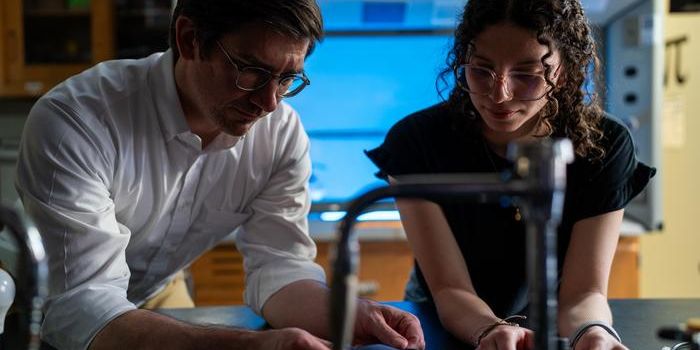Novel Technology Analyzes Single Cancer Cells
Recent technology may help for the first time to enable cancer scientists the analysis of individual behavior of millions of different cells living inside lab-grown tumors. The technology may lead to breakthrough which can lead to new personalized cancer treatments. Findings of the study were published in Nature Methods and indicate how mutated cancer cells "mimic the growth signals" that are normally expressed by healthy cells—these signals allow cancer cells to grow unchecked.
"Our new technology allows us to simultaneously measure the behaviour of cancer cells, healthy cells, and immune cells from mini-tumours,” says corresponding author, Dr. Chris Tape of UCL Cancer Institute. "This new technique revealed that mutations in cancer cells mimic the growth signals normally provided by cells in the healthy tissue microenvironment. In healthy tissues, signals from the environment are tightly controlled so the tissue doesn't grow too fast. Unfortunately in cancer, mutations that mimic microenvironment signals are constantly switched on -- allowing the cancer to grow unchecked.”
Learn more about how cancer cells go unchecked:
"The new technology developed at UCL enabled scientists to observe this phenomenon in minute detail,” adds Dr. Tape.
On a global scale, cancer researchers are now studying cancer using mini-tumours called 'organoids'—these are grown using cancer stem cells embedded in collagen in the lab. The 3D mini-tumors hold diverse cells that identify a patient's cancer in comparison to conventional methods used in research that observes a collection of identical cells grown in 2D. Such studies can indicate how cancer be studied in more detail.
"By understanding how mini-tumours function at the single-cell level, this new technology will enable researchers to identify new ways to treat an individual's cancer," said Dr Tape. "We expect that in the future an individual patient will have mini-tumours grown as 'living biopsies' alongside their clinical treatment.”
Most methods that analyze cancer cells are used to grinding up all the cells in a mixture. This limits how scientists assess the characteristics of individual cells and how they behave with other healthy and immune cells that influence cancer outcomes. Such challenges allowed scientists at UCL Cancer Institute to develop a new mass spectrometry platform to measure communication signals in millions of single cells from mini-tumours. The novel technique that preparers cells for analysis on a mass spectrometer—the subcellular level involved heavy metal-tagged antibodies to individual cell surface proteins.
Learn more about mass spectrometry:
"We will be able to test drugs on the mini-tumours and use that to inform how the patient's individual tumour should be treated,” said Dr. Tape. "Unlike old approaches, our new method can also be used to study immunotherapies -- not just chemotherapies -- because it can measure lots of different cell types at once. Old methods could really only look at one cell type at a time."
Source: Science Daily



![Master Lab Weighing: Accuracy, Compliance & Audits [eBook]](https://d3bkbkx82g74b8.cloudfront.net/eyJidWNrZXQiOiJsYWJyb290cy1pbWFnZXMiLCJrZXkiOiJjb250ZW50X2FydGljbGVfcHJvZmlsZV9pbWFnZV85MWRmZmRjMDIwNDBlMWJjMzYwN2ZiYWY2ZjI4ZGMzYzBmZGMwZGMyXzkxOTcucG5nIiwiZWRpdHMiOnsidG9Gb3JtYXQiOiJqcGciLCJyZXNpemUiOnsid2lkdGgiOjcwMCwiaGVpZ2h0IjozNTAsImZpdCI6ImNvdmVyIiwicG9zaXRpb24iOiJjZW50ZXIiLCJiYWNrZ3JvdW5kIjoiI2ZmZiJ9LCJmbGF0dGVuIjp7ImJhY2tncm91bmQiOiIjZmZmIn19fQ==)





